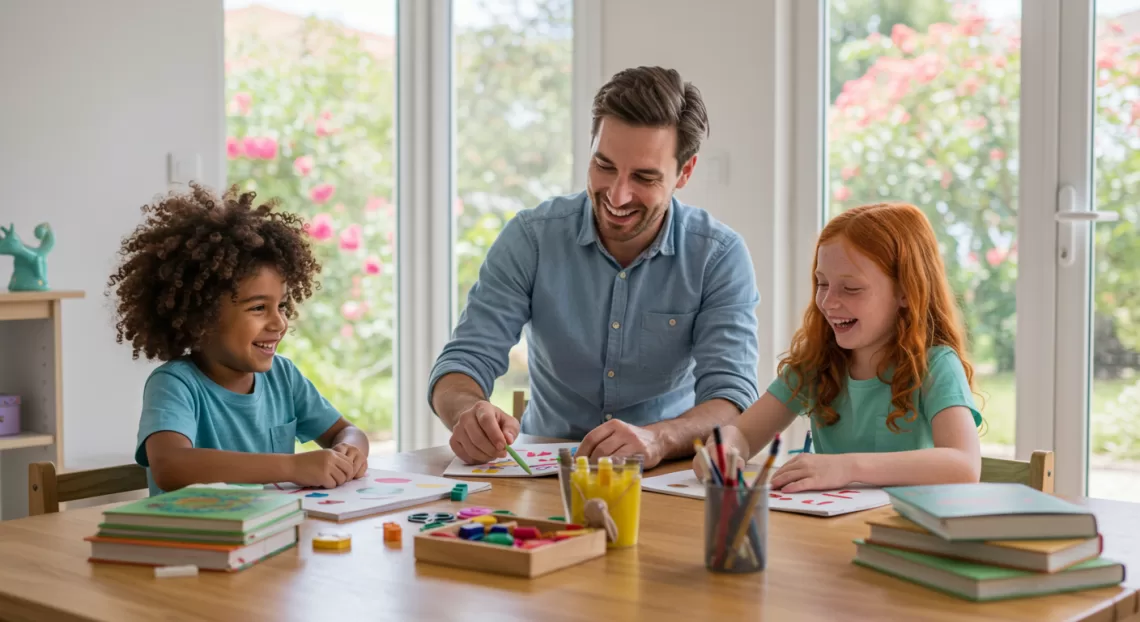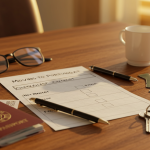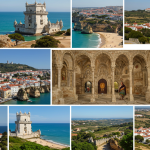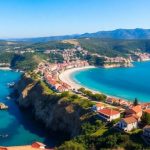
Is Homeschooling Legal in Portugal? What You Need to Know
Homeschooling in Portugal: Your Guide to the Laws & Lifestyle
Visual: A beautifully designed image featuring a serene, sun-drenched scene. In the foreground, a family (parents and two children, perhaps 8-12 years old) is gathered around a table on a spacious patio or balcony, looking out over a picturesque Portuguese landscape – perhaps rolling hills, a charming village with terracotta roofs, or a glimpse of the ocean. Books, a laptop, and a globe are subtly placed on the table, indicating learning. The overall atmosphere is warm, inviting, and peaceful.
Text Overlay:
The full blog post title is overlaid on the right side of the image, using a modern, bold sans-serif font.
Homeschooling in
Portugal:
Your Guide to the
Laws & Lifestyle
Introduction
Portugal, with its sunny climate, rich history, and welcoming culture, has become a top choice for expats and digital nomads seeking a new life abroad. Many families considering a move to this beautiful country also wonder about their children’s education options, especially if they’re used to or interested in homeschooling.
Is homeschooling even allowed in Portugal? What are the rules? How do you make it work while embracing the Portuguese lifestyle? This guide will answer all your questions, helping you understand the Portugal homeschooling laws and navigate the process with confidence. We’ll cover everything from legal requirements to daily life, ensuring you have all the information you need to make an informed decision for your family’s educational journey in Portugal.
Key Takeaways
- Homeschooling is Legal but Regulated: Portugal allows homeschooling (known as “ensino doméstico”), but it’s not a free-for-all. There are specific laws and steps you must follow.
- Mandatory Registration: You must register your child for homeschooling with the local school district (or DGEstE) that corresponds to your residence each year.
- Curriculum & Assessment: While there’s flexibility, your child’s education must generally follow the national curriculum guidelines and include annual assessments or evaluations.
- Parental Responsibility: Parents are fully responsible for providing the education, but a designated “tutor” teacher from the registered school will monitor progress.
- Embrace the Lifestyle: Homeschooling in Portugal can offer amazing flexibility for travel, cultural immersion, and learning Portuguese, blending education with a vibrant expat life.
Is Homeschooling Legal in Portugal? (Yes, But There Are Rules!)
Good news for families considering a move to Portugal: homeschooling is indeed legal! It’s officially recognized as “ensino doméstico” (domestic education) or “ensino individual” (individual education) under Portuguese law. This means you have the right to educate your children at home, but it’s important to understand that this right comes with specific responsibilities and regulations.
The primary legal framework for homeschooling is laid out in Decree-Law No. 55/2018 (Decreto-Lei n.º 55/2018), which defines the curriculum, assessment, and general organization of basic and secondary education. It specifies how homeschooling should be carried out to ensure children receive an education comparable to that offered in traditional schools.
In essence, Portugal takes education seriously, whether it’s in a classroom or at home. The government wants to make sure all children receive a quality education that prepares them for their future. So, while you have the freedom to homeschool, you’ll need to follow the official steps to prove your child is getting a proper education.
Who Can Homeschool in Portugal? (Eligibility Criteria)
Before you pack your bags and set up a classroom in your new Portuguese home, it’s good to know who is eligible to homeschool.
Generally, homeschooling is for:
- Parents or Legal Guardians: The primary responsibility for teaching falls on the child’s parents or legal guardians. You are the ones who will be guiding their learning journey.
- Children of Compulsory School Age: In Portugal, education is mandatory from age 6 to 18. This means if your child falls within this age range, they must be either enrolled in a registered school or officially homeschooled.
- Children Who Have Not Started School Yet (or are in early grades): It’s often easier to start homeschooling from the beginning of a child’s educational journey. For older children who have been in a traditional school system, there might be specific requirements or assessments to ensure a smooth transition to homeschooling.
It’s crucial to understand that while you are the primary educator, the Ministry of Education still oversees your child’s progress. This isn’t about avoiding the system; it’s about being an active, recognized part of it.
The Registration Process: Your First Step
Registering your child for homeschooling is the most important administrative step. It needs to be done correctly and on time. Think of it like enrolling your child in a school, but instead, you’re enrolling them in a homeschooling program under the state’s supervision.
Where to Register
You must register your child with the local public school that corresponds to your residential address in Portugal. This school will become the “home base” for your child’s homeschooling journey and will assign a “tutor” teacher to oversee their progress. The overall supervision is done by the Direção-Geral dos Estabelecimentos Escolares (DGEstE), which is like the general directorate for school establishments.
Required Documents and Information
When you go to register, you’ll typically need to provide:
- Child’s Identification:
- Birth certificate (or equivalent document)
- Passport or ID card
- Parent/Guardian Identification:
- Passport or ID card for both parents/legal guardians
- Proof of residence in Portugal (e.g., utility bill, rental contract, or Atestado de Residência from your local Junta de Freguesia – parish council)
- Previous School Records (if applicable): If your child was previously enrolled in a school (in Portugal or abroad), you’ll need their last report card or certificate.
- Educational Plan (Projeto Pedagógico): This is a crucial document. It’s a detailed plan outlining:
- Your teaching approach: How you plan to educate your child.
- Curriculum: What subjects you will cover, aligning with the national curriculum for their age group.
- Learning materials: What resources you’ll use (books, online programs, field trips).
- Assessment methods: How you’ll track progress.
- Schedule: A general idea of your learning routine.
Timeline and Annual Renewal
The registration process usually takes place before the start of the school year (typically in May/June for the following September). It’s an annual requirement, meaning you’ll need to re-register your child each year they are homeschooled.
“Starting early with the registration process is key! Portuguese bureaucracy can take time, so don’t wait until the last minute.”
Here’s a simplified checklist for registration:
- Find your local public school: This is based on your Portuguese address.
- Gather documents: Child’s ID, parent’s ID, proof of residence, previous school records.
- Prepare your Educational Plan (Projeto Pedagógico): This shows how you’ll teach.
- Submit your application: Usually in person at the school secretariat.
- Await approval: The school and DGEstE will review your application.
- Annual Renewal: Remember to repeat this process every year!
Curriculum and Learning: What You Need to Teach
While homeschooling offers incredible flexibility, Portugal expects your child’s education to align with the national curriculum guidelines. This doesn’t mean you have to strictly follow every single textbook page, but it does mean covering the core subjects and learning objectives for your child’s age group.
The National Curriculum Guidelines
The Portuguese national curriculum sets out what children should learn at different stages (cycles) of their education:
- 1st Cycle (1st to 4th grade): Focus on basic literacy (Portuguese language), mathematics, environmental studies, and artistic expression.
- 2nd Cycle (5th and 6th grade): Introduces history, geography, natural sciences, and a foreign language (usually English).
- 3rd Cycle (7th to 9th grade): Deeper dives into all subjects, including physics, chemistry, and often a second foreign language.
- Secondary Education (10th to 12th grade): More specialized, with different streams (science, humanities, arts, vocational).
Your “pedagogical project” (educational plan) should demonstrate how you will cover these areas. You have the freedom to choose your methods, materials, and daily schedule, but the content should generally match what a child would learn in a Portuguese school.
Flexibility in Practice
The beauty of homeschooling lies in its adaptability. You can:
- Choose your resources: Use international curricula, online programs, textbooks, educational apps, or a mix of everything.
- Integrate real-world learning: Portugal offers endless opportunities for hands-on education. History can be learned by visiting ancient castles 🏰, science by exploring the coast, and geography by traveling across the country.
- Tailor to your child’s pace: If your child excels in math, they can move faster. If they need more time with Portuguese, you can dedicate extra attention.
- Focus on interests: While covering core subjects, you can dive deeper into topics that genuinely excite your child.
Assessments and Monitoring: How Progress is Tracked
A key part of the Portugal homeschooling laws is ensuring that homeschooled children are indeed learning and progressing. This is done through a system of assessments and monitoring.
The Role of the Tutor Teacher
Once your homeschooling application is approved, the local public school will assign a “tutor” teacher (professor-tutor or professor-orientador) to your child. This teacher is your main point of contact with the school system. Their role is to:
- Provide guidance: Offer advice on the curriculum, resources, and educational strategies.
- Monitor progress: Check in periodically (e.g., once or twice a year) to see how your child is doing. This might involve looking at their work, discussing their learning, or observing a learning session.
- Facilitate assessments: Guide you through the annual evaluation process.
Annual Evaluations
The most significant part of monitoring is the annual evaluation. This ensures your child is meeting the required learning objectives for their grade level. There are generally two main ways this happens:
- Exams (Exames Nacionais): For certain grade levels (e.g., end of 4th, 6th, 9th, and 12th grades), children may be required to sit for national exams at the assigned school, just like traditionally schooled children. These exams cover core subjects like Portuguese and Math.
- Portfolio Review/Oral Assessment: For other grades, the assessment might be a more flexible process. This could involve presenting a portfolio of your child’s work throughout the year, followed by an oral assessment or discussion with the tutor teacher and a small committee from the school. This allows you to demonstrate learning in various ways, not just through traditional tests.
The goal of these assessments is not to “catch you out” but to confirm that your child is progressing and to provide support if needed. It’s a way for the Portuguese education system to ensure educational standards are met for all children.
Comparison of Assessments:
| Feature | Traditional School Assessment | Homeschooling Assessment |
|---|---|---|
| Method | Regular tests, assignments, projects, class participation, exams | Annual exams (for specific grades) OR portfolio review & oral assessment |
| Who Assesses | Classroom teachers, school board | Designated tutor teacher, school committee, national exam board |
| Frequency | Throughout the school year, term by term | Annually |
| Purpose | Track progress, assign grades, promote to next grade level | Ensure learning aligns with national standards, determine promotion |
| Flexibility | Less flexible, standardized | More flexible in method (especially portfolio option) |
Advantages of Homeschooling in Portugal for Expats
Choosing to homeschool in Portugal can offer unique benefits, especially for expat and traveling families.
- Flexibility for Travel & Exploration: Portugal is a country begging to be explored! Homeschooling allows you to integrate travel into your curriculum. Imagine learning about Roman history while visiting Évora’s ancient temple, or marine biology at the Lisbon Oceanarium. 🗺️
- Tailored Education: You can customize the learning experience to your child’s specific needs, interests, and learning style. If they’re passionate about coding, you can spend more time on it. If they need extra help with a subject, you can provide it. 🧑🏫
- Deeper Cultural Immersion: Being homeschooled can give children more time to immerse themselves in the local culture, learn Portuguese, and participate in community activities. This can lead to a richer, more authentic expat experience. 🇵🇹
- Stronger Family Bonds: Spending more time together, learning and exploring, can significantly strengthen family relationships. You become central to your child’s daily growth and discovery. ❤️
- Avoid School Bureaucracy (of traditional schools): While homeschooling has its own rules, it often bypasses the daily schedules, school runs, and parent-teacher meetings associated with traditional schooling.
Challenges and Considerations
While the advantages are appealing, it’s also important to be realistic about the challenges of homeschooling in Portugal.
- Bureaucracy and Paperwork: The initial registration and annual renewal can feel daunting, especially if you’re not fluent in Portuguese. Be prepared for forms, appointments, and potentially slow processes.
- Finding Resources and Support: Depending on your location, finding homeschooling groups or resources in English might be challenging. You’ll need to be proactive in seeking out communities.
- Socialization Opportunities: This is a common concern. You’ll need to actively seek out opportunities for your child to socialize, such as:
- Sports clubs ⚽
- Music lessons 🎶
- Local youth groups
- Homeschooling co-ops (if available)
- Community events
- Parental Commitment: Homeschooling requires significant time, energy, and dedication from parents. You become the primary educator, curriculum planner, and motivator.
- Language Barrier: While many Portuguese speak English, navigating official processes and fully immersing in the culture will require some Portuguese language skills. This applies to both parents and children. Consider taking Portuguese lessons!
Resources and Support for Homeschooling Families
Even though it might seem like a solo journey, you’re not alone! Many resources can help you succeed with homeschooling in Portugal:
- Online Communities: Facebook groups like “Homeschooling Portugal” or “Expats in Portugal” often have dedicated threads or groups for homeschooling families. These are great for asking questions, sharing tips, and finding local meetups.
- Educational Materials: Many online curricula (e.g., Khan Academy, Time4Learning, IXL) are widely used by homeschoolers globally and can be adapted to meet Portuguese curriculum requirements. Don’t forget local libraries for books and resources.
- Portuguese Language Resources: Investing in Portuguese language lessons for both you and your children will greatly ease your integration and access to local resources. Apps like Duolingo or Babbel are a good start, but consider formal lessons.
- Fincou: For general guidance on moving to and living in Portugal, Fincou offers a wealth of information. While not specifically for homeschooling, our guides on moving to Portugal and visa processes can be invaluable as you plan your relocation. You can also learn more about our privacy policy.
Integrating into Portuguese Life While Homeschooling
Homeschooling provides an incredible opportunity to truly integrate into the Portuguese way of life, beyond just learning facts from books.
- Community Activities: Enroll your children in local sports teams (football, swimming), music classes, dance lessons, or art workshops. This is an excellent way for them to make Portuguese friends and practice the language in a natural setting.
- Field Trips and Excursions: Portugal is a living classroom!
- Visit historic sites like the Belém Tower in Lisbon or the Roman Temple of Évora.
- Explore natural parks, beaches, and national monuments.
- Go to local markets to learn about fresh produce and traditional foods.
- Learn about marine life at the Oceanário de Lisboa.
- Discover the unique vibes of Madeira, Portugal.
- Language Exchange: Seek out opportunities for language exchange, either with local families or through online platforms. Learning Portuguese will unlock so many doors for your family.
- Volunteering: Depending on your children’s age, volunteering can be a fantastic way to contribute to the community and gain practical skills.
- Embrace the Pace: Portugal often has a more relaxed pace of life. Use this to your advantage to foster a calm and curious learning environment.
Wondering more about daily life? Check out our insights on is Portugal a good place to live and practical guides like how to rent a studio in Lisbon if you’re planning to live in the capital.
Beyond Homeschooling: Other Educational Options
While this guide focuses on homeschooling, it’s good to be aware of other educational paths available in Portugal, especially as your children grow or if your family’s needs change.
- Public Schools (Escolas Públicas): These are free and follow the national curriculum. They are an excellent option for full immersion in Portuguese language and culture. Class sizes can vary, and the teaching style is generally traditional.
- Private Schools (Colégios Privados): These schools offer more varied curricula, sometimes including specialized programs or religious instruction. They are fee-paying and may offer smaller class sizes or different educational philosophies.
- International Schools: Located primarily in major cities like Lisbon, Porto, and the Algarve, international schools offer curricula like the British, American, or International Baccalaureate (IB) systems. They are popular with expats and teach in English (or other non-Portuguese languages). These are often the most expensive option but provide continuity for families who move frequently.
Many expat families choose homeschooling for the early years and then transition to a local or international school for secondary education, or vice-versa. The flexibility of Portugal’s education system allows for these choices.
Important Links for Your Portuguese Journey
Here are some helpful links to guide you further:
- For general information about moving to Portugal and our services: Fincou
- A comprehensive guide to the visa and immigration process in Portugal.
- Insights into whether Portugal is a good place to live.
- Discover the unique vibes of Madeira.
- Tips on how to rent a studio in Lisbon.
Conclusion
Homeschooling in Portugal is a viable and enriching educational option for expats and travelers, offering a unique blend of academic freedom and cultural immersion. While the Portugal homeschooling laws require careful attention to registration, curriculum guidelines, and annual assessments, the system is designed to support families in providing a quality education.
By understanding the regulations, preparing thoroughly, and actively seeking out local resources and community engagement, you can create an unforgettable learning experience for your children. Portugal offers a stunning backdrop for family adventures, hands-on learning, and a truly integrated lifestyle. Embrace the journey, and you’ll find that homeschooling here can be one of the most rewarding aspects of your family’s expat adventure. Boa sorte (Good luck)!
Interactive HTML Element: Portugal Homeschooling Registration Checklist
🇵🇹 Portugal Homeschooling Registration Checklist
Tick off each step as you complete it!



